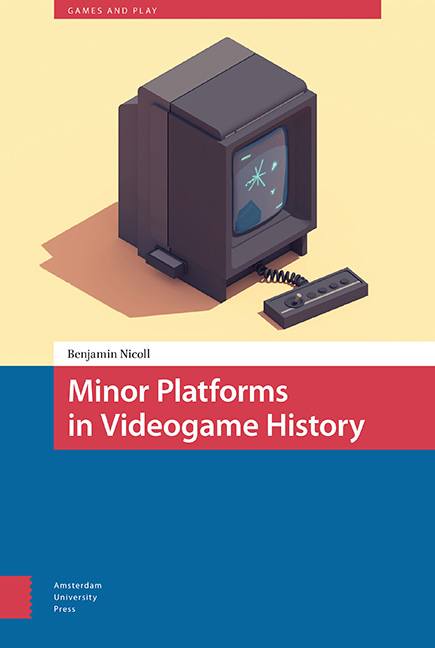Book contents
- Frontmatter
- Contents
- List of Tables and Figures
- Acknowledgements
- Introduction : Failed, Forgotten, or Overlooked? Methods for Historicizing Minor Platforms
- 1 Ways of Seeing Videogame History: The Vectrex as a Transitional Platform
- 2 Articulations of Videogame Piracy: The Zemmix as a Decolonial Platform
- 3 Domesticating the Arcade: The Neo Geo as an Imaginary Platform
- 4 A Dialectic of Obsolescence? The Sega Saturn as a Residual Platform
- 5 ‘How History Arrives’: Twine as a Minor Platform
- Conclusion: ‘Something new in the Old’
- Index
Conclusion: ‘Something new in the Old’
Published online by Cambridge University Press: 21 November 2020
- Frontmatter
- Contents
- List of Tables and Figures
- Acknowledgements
- Introduction : Failed, Forgotten, or Overlooked? Methods for Historicizing Minor Platforms
- 1 Ways of Seeing Videogame History: The Vectrex as a Transitional Platform
- 2 Articulations of Videogame Piracy: The Zemmix as a Decolonial Platform
- 3 Domesticating the Arcade: The Neo Geo as an Imaginary Platform
- 4 A Dialectic of Obsolescence? The Sega Saturn as a Residual Platform
- 5 ‘How History Arrives’: Twine as a Minor Platform
- Conclusion: ‘Something new in the Old’
- Index
Summary
Abstract
In the conclusion, I argue that minor platforms enable videogame scholars to re-encounter the ‘strangeness’ of their object of study. Game studies scholars often bring very normative frames of reference to bear upon their researched objects and subjects. The aim of this chapter is to reorient (or perhaps disorient) our relationship to an ostensibly ‘normal’ and everyday object in the study of videogames: the videogame platform. Minor platforms thus point not only to suppressed moments of transition and rupture in videogame history. They also disorient the present and point toward alternative possibilities for a future yet to come.
Keywords: game studies, orientations, surface effects, queer phenomenology, platform studies
To do game studies, I think, is to watch the wheel of history grinding against our theoretical castles. And that's enough.
‒ Jesper Juul, 2018: n.p.In 2015, fourteen years after declaring ‘year one’ for game studies as a specialized area of scholarly research, Espen Aarseth (2015: n.p.) made an equally bold declaration in an editorial for the open-access web journal Game Studies: ‘game studies is a success. We did it’. For Aarseth (2015: n.p.), the proof of game studies’ success is in the proverbial pudding: there are, now, numerous international conferences, research centres, and publication venues dedicated to the study of videogames. Furthermore, claims Aarseth, videogames are now ‘accepted’ as a viable area of research in disciplines where they were previously shunned. Meanwhile, orthodox game studies conferences such as DiGRA (Digital Games Research Association) are not nearly as widely attended as they were in the early 2000s—a good sign, according to Aarseth, because it indicates that the field's early exponents have found homes in neighbouring disciplines.
For Aarseth, game studies is a ‘success’ because it has become successfully standardized, no longer defined by its difference within the academy but instead by its normality. Few would argue that this is a bad thing—after all, it implies that videogames are no longer cordoned off into their own special domain, their own ‘magic circle’. It also implies that the field has shed its preoccupations with formalism; that the medium can be brought into contact with a diverse range of perspectives, frameworks, and methodologies from other research areas.
- Type
- Chapter
- Information
- Minor Platforms in Videogame History , pp. 191 - 200Publisher: Amsterdam University PressPrint publication year: 2019



